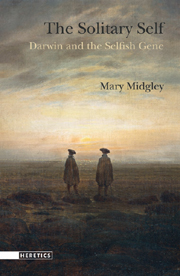Book contents
Conclusion: the wider perspective
Summary
In this book we have been looking at some of the thousand-and-one reasons why there can be no such simple solutions. The thing is that, as Darwin pointed out, a social animal that has imprudently let itself become aware of the clashes between its various motives is never going to find life straightforward. The work of harmonizing different aims must always go on. We do right to look for simplicity and to use it when we can find it. But we can never expect it – as seventeenth-century thinkers so often did – to be the final truth. We shall always have to do some of the work ourselves.
Darwin's enquiry seems to me really helpful here. Although it starts from an animal context it plainly does not reduce human qualities to those of other animals. It does justice to our special human difficulties and achievements. It centres on the recognition of conflict, on the clashes of motive that increasing self-knowledge must have gradually revealed to our ancestors, clashes that other animals too experience but briefly, since they live more or less in the moment. Our difficulty here – and our great blessing – is that we live in a much longer time perspective. Our longer memories are, as Darwin shrewdly pointed out, not just inert stores but active, interfering commentators, constantly reminding us of things that we would rather forget. This means that other people are constantly present to us and must always be considered, so that mutual influence continually flows between us.
- Type
- Chapter
- Information
- The Solitary SelfDarwin and the Selfish Gene, pp. 139 - 144Publisher: Acumen PublishingPrint publication year: 2010

